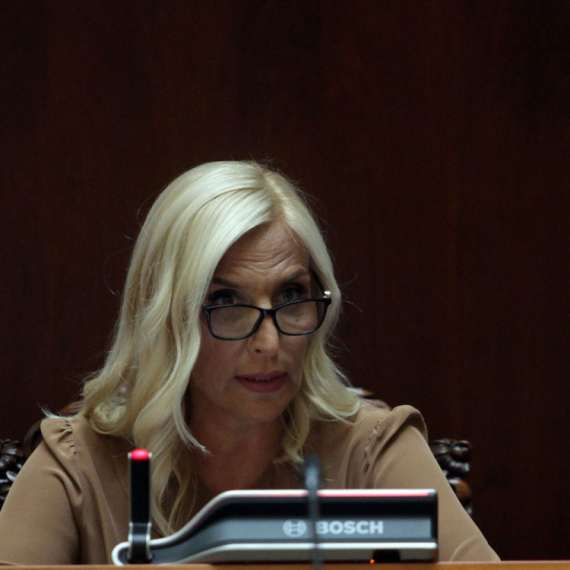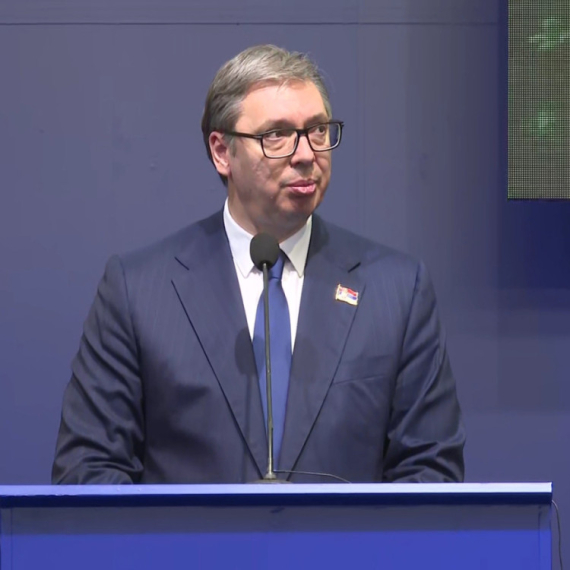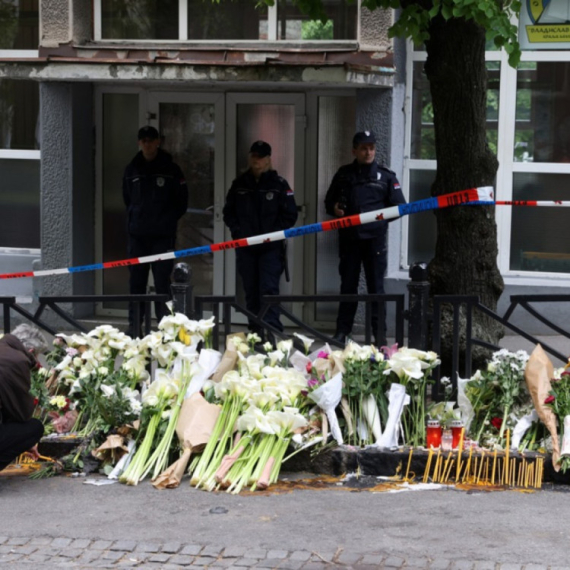Government measures "good - could be more ambitious"
The economic measures announced by the Serbian government are good, but could be more ambitious, head of the IMF office in Serbia Daehaeng Kim said on Monday.
Tuesday, 15.10.2013.
12:05

BELGRADE The economic measures announced by the Serbian government are good, but could be more ambitious, head of the IMF office in Serbia Daehaeng Kim said on Monday. The important thing is that the government has agreed that the country needs fiscal consolidation, Kim said at the 13th Economic Summit in Belgrade. Government measures "good - could be more ambitious" Serbia needs sustainable growth more than anything, and stable macroeconomic conditions are a requirement for that, he stressed. Fiscal consolidation, structural reforms and a continuation of a flexible exchange rate are three elements that complement each other and that Serbia needs at the moment, he noted. Fiscal consolidation is of crucial importance, and its implementation requires better tax collection, a battle against the gray economy, lower consumption and lower subsidies, which currently cost Serbia a lot, he pointed out. Reforms of the pension system, administration, government companies and education are necessary within the scope of structural reforms, Kim stated. "Also, the market needs to be diversified, the labor market liberalized, bureaucracy and regulations reduced, management in economy improved and the government's influence in the economy lessened," he remarked. The conference in Belgrade (Tanjug) "No growth" Vladimir Vuckovic, member of the Serbian government's Fiscal Council, has said that economic growth cannot be expected next year or it will stand around 0.5 percent. "There will be no economic growth or it will go up to 0.5 percent," Vuckovic said at an economic conference in Belgrade on Monday. This will not be the result of the recent measures that the Serbian government has adopted, but rather of what was done or what was not done in the previous few years, he said. "There would be no growth without these measures as well," Vuckovic said, adding that the sources of growth for the next year cannot be considered, noting that this year these were the production of car manufacturer Fiat Srbija (Fiat Serbia) and agricultural production, while other sectors were in recession. The next year's budget deficit, in spite of all efforts, cannot be lower than this year that is it will stand at around six percent of GDP, he said. If it were not for the government's measures, the deficit could reach eight or nine percent of GDP in 2014, he said. "Without the measures we would have higher deficit and public debt, while the economic growth would be around zero," Vuckovic said. "Magnet" Faster EU accession, better position in the world and economic consolidation are the goals of the Serbian government in the coming period, Serbian Prime Minister Ivica Dacic said on Monday. "Serbia is a good place for investments - it has good relations with neighbours and it is not threatened by economic, political or security destabilization," Dacic said at the 13th economic summit in Belgrade whose media partner is Tanjug news agency. The government has launched structural reforms, Dacic said and called on foreign investors to invest in Serbia. Speaking about Serbia's potentials, Dacic "recalled the occasion when U.S. Vice President Joe Biden told him that once Serbia gets a date for the EU accession talks, and with the position it has now, it will be a magnet for investments." Dacic said that he "holds Biden to that," adding that "we should make the magnet work." The prime minister said that for the sake of Serbia's faster EU accession it is necessary to implement the Brussels agreement on normalization of Belgrade-Pristina relations reached on April 19. He said that it is necessary to improve Serbia's position in the world since otherwise the government would not be able to achieve any goal. In terms of internal affairs, the government's goal is to stop the downward spiral which has led to constant increase of the country's indebtedness without the increase of industrial production. Dacic said that now Serbia's GDP amounts to 65 percent of the level it had in 1989, the indebtedness rate is around 60 percent of the GDP, and the unemployment rate of 23 percent, while over 50 percent of young people are unemployed. "This creates difficulties in functioning of the state and problems with liquidity," he said, adding that in the previous years the greatest decrease of activities was recorded in the real sector that is industrial production. Therefore, the government has taken measures decisively to secure financial and economic consolidation which is a condition for preventing the economic downfall, Dacic said. Tanjug
Government measures "good - could be more ambitious"
Serbia needs sustainable growth more than anything, and stable macroeconomic conditions are a requirement for that, he stressed.Fiscal consolidation, structural reforms and a continuation of a flexible exchange rate are three elements that complement each other and that Serbia needs at the moment, he noted.
Fiscal consolidation is of crucial importance, and its implementation requires better tax collection, a battle against the gray economy, lower consumption and lower subsidies, which currently cost Serbia a lot, he pointed out.
Reforms of the pension system, administration, government companies and education are necessary within the scope of structural reforms, Kim stated.
"Also, the market needs to be diversified, the labor market liberalized, bureaucracy and regulations reduced, management in economy improved and the government's influence in the economy lessened," he remarked.
"No growth"
Vladimir Vučković, member of the Serbian government's Fiscal Council, has said that economic growth cannot be expected next year or it will stand around 0.5 percent."There will be no economic growth or it will go up to 0.5 percent," Vučković said at an economic conference in Belgrade on Monday.
This will not be the result of the recent measures that the Serbian government has adopted, but rather of what was done or what was not done in the previous few years, he said.
"There would be no growth without these measures as well," Vučković said, adding that the sources of growth for the next year cannot be considered, noting that this year these were the production of car manufacturer Fiat Srbija (Fiat Serbia) and agricultural production, while other sectors were in recession.
The next year's budget deficit, in spite of all efforts, cannot be lower than this year that is it will stand at around six percent of GDP, he said.
If it were not for the government's measures, the deficit could reach eight or nine percent of GDP in 2014, he said.
"Without the measures we would have higher deficit and public debt, while the economic growth would be around zero," Vučković said.
"Magnet"
Faster EU accession, better position in the world and economic consolidation are the goals of the Serbian government in the coming period, Serbian Prime Minister Ivica Dačić said on Monday."Serbia is a good place for investments - it has good relations with neighbours and it is not threatened by economic, political or security destabilization," Dačić said at the 13th economic summit in Belgrade whose media partner is Tanjug news agency.
The government has launched structural reforms, Dačić said and called on foreign investors to invest in Serbia.
Speaking about Serbia's potentials, Dačić "recalled the occasion when U.S. Vice President Joe Biden told him that once Serbia gets a date for the EU accession talks, and with the position it has now, it will be a magnet for investments."
Dačić said that he "holds Biden to that," adding that "we should make the magnet work."
The prime minister said that for the sake of Serbia's faster EU accession it is necessary to implement the Brussels agreement on normalization of Belgrade-Priština relations reached on April 19.
He said that it is necessary to improve Serbia's position in the world since otherwise the government would not be able to achieve any goal.
In terms of internal affairs, the government's goal is to stop the downward spiral which has led to constant increase of the country's indebtedness without the increase of industrial production.
Dačić said that now Serbia's GDP amounts to 65 percent of the level it had in 1989, the indebtedness rate is around 60 percent of the GDP, and the unemployment rate of 23 percent, while over 50 percent of young people are unemployed.
"This creates difficulties in functioning of the state and problems with liquidity," he said, adding that in the previous years the greatest decrease of activities was recorded in the real sector that is industrial production.
Therefore, the government has taken measures decisively to secure financial and economic consolidation which is a condition for preventing the economic downfall, Dačić said.


























































Komentari 0